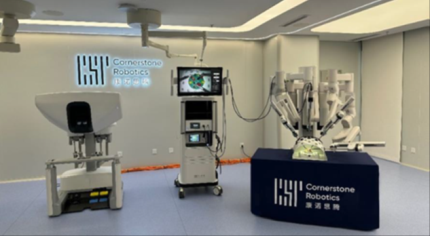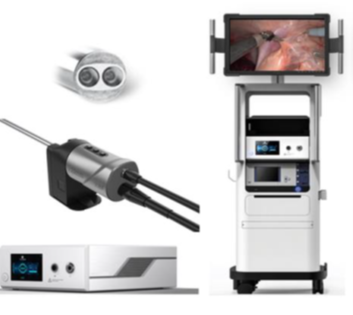|
Author: Professor Au Kwok Wai Samuel, Department of Mechanical and Automation Engineering
Robotic surgery, particularly in the realm of soft-tissue laparoscopic interventions, has shown considerable progress over the years. Yet, its widespread adoption is significantly hampered by issues of accessibility. In regions like Hong Kong and Mainland China, the growing demand for surgical services due to an aging population exacerbates the challenge, compounded by a shortfall in adequately trained surgeons. While robotic surgical technologies promise improved clinical outcomes and a reduced learning curve for trainees, their high costs restrict broader clinical use.
The research project led by Professor Samuel Au Kwok-Wai from Department of Mechanical and Automation Engineering is strategically designed to address these barriers by enhancing the accessibility of robotic surgery. Our aim is to refine the cost-effectiveness, safety, usability, and adaptability of robotic systems across key surgical fields including urology, gynecology, and general surgery. To validate the system's performance and reliability, our approach encompasses a comprehensive testing protocol that includes evaluations with phantom models, animal and cadaver studies, and rigorous clinical trials.
By enhancing the accessibility, affordability, and versatility of surgical robotics, we are poised to deliver substantial value across multiple spheres: enriching the high-tech industry ecosystem, improving outcomes for patients and surgeons, fostering local I&T development, especially in youth and education, and acting as a model case for Hong Kong startups expanding into the Greater Bay Area Regions and beyond. This initiative not only addresses critical healthcare needs but also propels the regional economy by integrating cutting-edge medical technologies with broader industrial and educational frameworks.
The CSR surgical robotic system's versatility and user-friendliness stem from several key technical innovations that enhance its performance across various surgical procedures. On the technology side, the multiple-port robotic surgical system is a versatile device that can be used for a variety of surgical procedures, including prostate, kidney, ENT, and even cardiac surgeries. These complex surgical procedures with human body constraints demand fine precision and extensive experience from surgeons. The first-generation CSR robotic surgical system provides surgeons with a precise and intuitive manipulation to improve surgery quality and efficacy (Figure 1).
 Figure 1. Cornerstone Robotics’ first-generation multi-port surgical robotic
system: Sentire Surgical Robotic System
CSR system is designed with the usage habits of doctors and nurses in mind, making it convenient and easy to use. For example, their high-definition and realistic imaging capabilities provide an immersive, stereoscopic vision, faithfully reproducing the surgical field of view (Figure 2).

Figure 2. Cornerstone Robotics’ 3D laparoscopic system
The CSR robotic surgical system exemplifies cutting-edge versatility in medical technology, capable of supporting a broad spectrum of surgical operations. Key to the CSR system's innovation is its advanced high-definition imaging capabilities, which provide surgeons with stereoscopic views that closely replicate the visual and spatial awareness inherent in traditional surgery. The CSR system is also designed with a highly sensitive and lightweight main hand, minimizing operational friction and enhancing surgical control. This engineering achievement not only facilitates smoother, more precise movements but also reduces tissue trauma, contributing to better surgical outcomes and quicker patient recovery.
Installation and operation of the CSR system are streamlined for efficiency; it requires minimal setup time and can be managed by a single nurse, simplifying the preparation process for surgeries. Quick instrument changes and adjustments during operations underscore its user-friendly design, which not only speeds up the training process for medical professionals but also minimizes potential conflicts and misunderstandings between doctors and patients, thereby optimizing the overall surgical workflow.
The project on advancing robotic surgery stands at the intersection of technological innovation and societal benefit, aimed at transforming the healthcare landscape not just in Hong Kong, but globally. This initiative not only addresses critical healthcare needs but also propels the regional economy by integrating cutting-edge medical technologies with broader industrial and educational frameworks. To tackle this problem, our approach includes the development and rigorous testing of the CSR system. By enhancing the accessibility, affordability, and versatility of surgical robotics, we are dedicated to deliver substantial value across various perspectives.
Value to Patients and Surgeons
Accessibility improvements directly benefit the local healthcare system by providing surgeons with advanced tools that enhance surgical precision and patient safety. For patients, this translates into better clinical outcomes, reduced recovery times, and overall improved healthcare experiences. Surgeons benefit from reduced physical strain and enhanced capability to perform complex procedures, which can lead to increased job satisfaction and professional growth.
Local I&T Technology Development
The project serves as a catalyst for local I&T development, particularly in nurturing talents in the fields of engineering, robotics, and healthcare technology. By aligning with educational institutions and research centers, the initiative supports the educational pipeline, equipping young people with the skills needed to thrive in a high-tech economy. This focus on education and skill development ensures a steady stream of talent to support ongoing innovations.
Impact on Local Startups and Expansion into Greater Bay Area
Our research in robotic surgery also exemplifies how local startups like Cornerstone Robotics can scale up and expand their reach. By developing technologies that are globally competitive yet locally relevant, the project paves the way for expansion into the Greater Bay Area and beyond. This not only helps the local startup ecosystem but also positions Hong Kong as a leader in the field of medical robotics, capable of servicing both China and international markets.
Societal Impact through Improved Healthcare Accessibility
At a broader societal level, improving accessibility to advanced surgical technologies means that high-quality healthcare can reach a wider audience. This democratization of technology leads to health equity improvements and supports the overall well-being of the population. It also sets a precedent for how technology can be used to address global health disparities. By focusing on these areas, it contributes significantly to societal well-being, economic development, and the global competitiveness of the Hong Kong tech industry.
|
